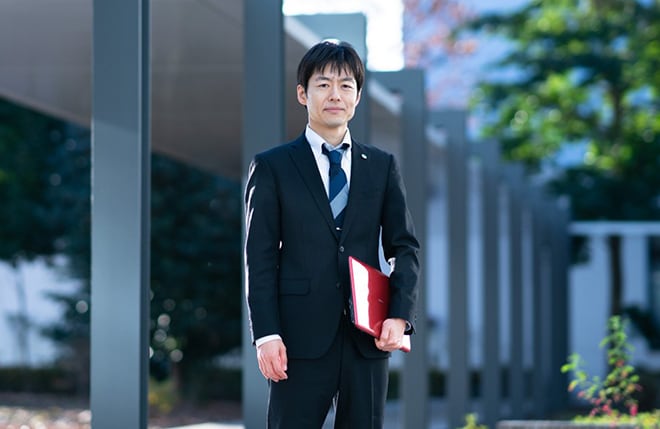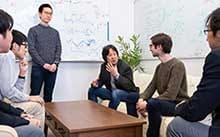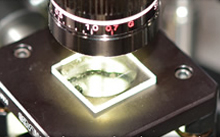During the dry, winter season, seasonal flu is prevalent every year. During the 2009 global influenza outbreak, many companies were forced to take countermeasures around the world. It is not just companies that need to respond to infectious diseases but also households, especially those with small children and the elderly.
The “Infectious Diseases Forecasting Service” is an initiative that began in Japan from a personal experience of a Hitachi researcher, in which he faced difficulties in balancing work and family responsibilities when his own child was afflicted with influenza.
The service analyzes real-time data on the number of people infected with influenza from various medical institutions using Hitachi AI and forecasts the risk of epidemics in each region up to four weeks in advance. By sending information via social media and the internet, people are able to take quick action toward reducing the burden on their families.

Takumi Tandou, a researcher at Hitachi, Ltd., R&D Division
Over 40% of the estimated total number of patients with influenza last season (September 2018 to April 2019) were children of age 0–14. For more than 12 million double-income households across Japan, infectious diseases that threaten the health of children, may become a major barrier to daily work.
Takumi Tandou, a researcher at Hitachi, Ltd., R&D Division, was also one of those who experienced these problems. “I am in a double-income household, and we have three children. As we don’t live with our parents, if one of our children becomes ill, either my wife or I must stay home from work. We thought that, if we knew in advance about the location and timing of an epidemic, we could take adequate preventive measures. This was the beginning of my thinking about developing a service for local communities that could help prevent children from becoming ill,” says Tandou.

The biggest problem for a double-income family in japan is the illness of a child or family member.
(Source: Survey on Lifestyle and Awareness of Double-Income Families,
from EnviroLife Research Institute Co., Ltd., 2014)
Tandou was engaged in the development of semiconductor manufacturing equipment for nanofabrication and was an independent researcher in the field of medicine & biotechnology. When he happened to be using an scanning electron microscope, he turned his attention to nano-sized viruses and came up with the idea of applying AI learning to the data of the numbers of infected people in various regions so as to predict the spread of infectious diseases.
In order to realize this idea, Tandou first proposed the concept of the “Infectious Disease Forecasting Service” from within the “Social Innovation Leader Training Program,” which was designed to consider new businesses, and then continued discussions toward commercialization. After completing the training, he consulted a wide range of people both inside and outside the company and refined the idea. In the fall of 2017, he submitted an application for “SickNews,” an infectious disease forecasting service, at “Make a Difference!”, a business idea contest within the Hitachi Group to support the commercialization of business ideas. “SickNews” won the “Silver Ticket Award” out of nearly 500 entries from Japan and overseas, and, under the guidance of Hitachi executive mentors, the business plan was developed over several months and opened a way forward for obtaining investment for commercialization.
“My mentors told me at that time that I needed to confirm not only the feasibility of commercialization but also whether the new service was beneficial and worthwhile to people,” says Tandou. In order to achieve POV (Proof of Value), he consulted with a wide range of people within the company, from R&D divisions related to biotechnology and to other R&D divisions related to customer satisfaction. He also consulted with other companies in different industries.

In the prevention of infectious diseases, it is essential to have a true sense of crisis and to take quick, appropriate, preventive measures. Many people take care to gargle and wash their hands because they are aware of an “immediate crisis.” In order to take measures against influenza as well, it is effective to understand the signs and trends of the epidemic in the more-familiar sphere of one's life as quickly as possible. If the situation is recognized at an early stage , we would be able to speak out in the workplace or community before the epidemic occurs, and people will be more likely to take action to prevent the spread of the flu, such as by getting influenza vaccinations, careful handwashing, maintaining a proper indoor environment such as regarding humidity, and avoiding unnecessary crowds.
However, in the current situation, there is no means of getting information from nearby areas quickly. In order to solve this problem, SickNews focused on real-time data because public trends involving infectious diseases consist of information that takes a certain amount of time to become disseminated after an outbreak.
For this, data was provided by the Japan Medical Association's ORCA (Online Receipt Computer Advantage) Management Organization from more than 4,000 cooperative medical institutions in Japan, and the data on the number of patients with infectious diseases including influenza was compiled by each municipality as “ORCA Surveillance.” By utilizing AI learning, it has become possible to predict influenza epidemics up to four weeks in advance, all by using various information such as ORCA data and past epidemic areas and times.
As a result of the common desire of various people to reduce the number of people suffering from infectious diseases, on December 6, 2019, we began verification tests of the “Saitama City Influenza Forecasting Service” in Saitama City, Saitama Prefecture, located north of Tokyo, to forecast and distribute information on the epidemic status of influenza. In the verification tests, the real-time epidemic situation in the city and the epidemic situation of influenza are forecasted up to four weeks in advance, in four stages.

Screenview of the “Saitama City Influenza Forecasting Service” verification test website
In addition to providing information on the internet, a dedicated account has been established via the LINE communication app, where registrants can receive forecast information on a regular basis. Says Tandou: “As of December 23, 2019, more than 6,000 LINE accounts [there are about 600,000 households in Saitama City] have been registered, and we feel that there is a high level of interest and responsiveness from citizens.”
Going forward, with the aim of full-fledged commercialization, the plan is to conduct a verification of the effects from March this year, when the verification tests are complete. “To control an infectious disease in the community, it is important to reduce prevalence in children, as they are more susceptible to transmission and spreading. As a result, we believe that this will ultimately reduce the incidence of infectious diseases in the region,” says Tandou. ORCA surveillance also includes data on the number of patients infected with other infections and may increase the number of infections that it surveys in the future.
“The initial idea was to create a society in which children are healthy and parents can work with peace of mind, but we also wanted to provide a service that is effective for people of all age. Controlling infectious diseases will lead to a reduction of medical expenses in the future and will contribute to the realization of a sustainable society. Infectious diseases are not only an issue for Japan, so we are also thinking of global expansion,” says Tandou.

This business is now blossoming, thanks to the in-house business idea contest, “Make a Difference!” Hitachi Group, through our group's strengths and collaborative creation with domestic and overseas partners, will make every effort to solve not only infectious-disease issues but also social issues by continuing to foster the seeds of innovation within the group, with a focus on solving “commonplace problems” in everyday life, improving quality of life (QoL), and contributing to the UN Sustainable Development Goals.
Photos: Daisuke Yoshinari; location: Kyoso no Mori







